FAIQ #22: You Travel By Train In Ireland, Don’t You?
Q. You Travel By Train In Ireland, Don’t You?
A. We didn’t have a car when I was growing up. One appeared when I was around 15 and Dad magically was able to drive it. Being a walker and a cyclist, however, Dad didn’t drive it all that much. Perhaps the price of the petrol was a factor. And me being a teenager I travelled with my father in the car as often as other teenagers travelled with their fathers.
Cars were something one or two other families on the road had. And one or two uncles. They were strange machines with peculiar movement that induced uneasiness in the stomach and the brain. Only ever freezing in winter, in summer the seats burned your skin. And they always smelled of tobacco. The annual treat of the front seat never made these exotic trips enjoyable.
No, cars were an unfamiliar and unloved mode of movement for me growing up. My parents brought me up on foot, walking 10 miles on New Year’s Days, walking across the fields and ditches to the neighbouring parish for the messages, walking the country roads of Dublin West past knocked-down dogs and farms that were soon to disappear, walking in the hills we called mountains, and walking all over the only park that everyone called ‘The Park’.
And on the bus. Because I had older sisters I got to stand at bus stops hundreds if not thousands of times before I got to get on a bus without a parent. In a time before bus shelters I waited for the tea leaves to be applied to my sister’s eyes and then walked with them under the same umbrella in the raining darkness as we all struggled with the strings on our mittens on those cold mornings.
Waiting for buses is the apprenticeship for travelling on them. Waiting for them in Dublin’s city centre you were always by the Liffey wall, and like kids who skim stones on water we used gravity to bounce our spits down the inside of the dirty granite wall to the thick green soup of the river.
Travelling on these double-decked machines was nothing like being in a car. You could stand, walk, and climb in them. And you could look down the periscope at the driver. To really love buses you had to bang your head off the downstairs ceiling as you enthusiastically ascended the staircase. They were a mobile community of thrashing gossip and pontification.
After picking up the family meat on Stoneybatter and walking around craziness of Hector Gray’s you travelled home west along the quays and the river, aware that you were too young to speak, and so just listened to the elder spokespeople of Ireland knowing that your turn would come one day. One day you would speak on a bus, and total strangers would listen to your conversation.
Together, when a bus grinded up a hill, a full bus was a wonderful thing. A communal experience like standing on Hill 16 or just going down the local. And they didn’t smell of tobacco - they were a cloud of dense filthy fabulous smoke. And it never occurred to you to complain. Just like it never occurred to you until you were 19 to sit downstairs.
But when the weather turned sunny and what we called hot in Dublin, everyone we knew fled to the beaches near its bay. But those people were people with cars. They took me once or twice but it didn’t seem real and the beaches didn’t seem like beaches. Why? Because of the proximity to Dublin’s city centre. And because my Dad worked for the railway.
So when sun hit Dublin, myself and my older sisters were woken at an hour of the morning that usually only existed on Christmas Day, and we boarded a bus for town armed with bags of Tupperware containers. The buses were empty and fast at that hour and we ended up at Heuston or Connolly or Pearse. So when neighbours drove in their cars to Dollymount or Brittas Bay, or to Sutton, my family sped in trains to the other side of the country. To Salthill, or down to Rosslare, or anywhere far away where there was a beach.
Free travel on trains facilitated and maybe obligated a lot. Once our family took a shorter trip on the train and stayed local. Local for us was just one county away - in Arklow. It didn’t work. It was just too near. We hadn’t really travelled. To this day nobody in my family likes Arklow.
Growing up on trains means as much to me as growing up on anything means to anybody else. Yes I travelled on hundreds of them as an adult in Britain, and long ones on the continent of Europe as America, but it was the growing up on them as a child that becomes you. I was the one passed in the window to reserve the seats when on the platform our family was left standing midway between the doors. Until they brought out the Super Trains.
The Super Trains were exciting even though they were identical to regular trains except the windows didn’t open. Perhaps that made them go faster.
We all loved the trains with compartments when we got them, unless of course we had to share our compartment. Regardless of compartments there was tables, and toilets, and you could go visit people. As trips proceeded you made friends, and the atmosphere on a train returning to the capital at a weekend was always akin to a neighbourhood party. Always.
Outside you watched the wires dance their dance from pole to pole, and stared through hedgerows knowing you would see something that made staring through hedgerows worthwhile. People waved to you, but you never waved back (unless you were on a steam train when it was obligatory and anyway it helped keep the burning embers out of your eyes). And all the time it moved.
The train moved like no other machine. They could weld those tracks together and it would keep the noise down a bit, they could electrify the tracks to smooth things out and minimize that dynamic rhythym, but all the time the train moved. It moved and shook and rolled and swayed. It lulled you into excitement and it coaxed you into a sleep. It gently nudged your sitting shoulders and it taught you balance before skateboards or scooters did.
And out of the Tupperware containers came the salad sandwiches and the egg mayo sandwiches. They were endless. Some now had sand from the beach but you were concentrating on grabbing the sandwich as your arm swayed with the train.
And of course there was tea. A train was a moving home. Why give you a table if you were not meant to fill it with food, drink, cards and maps? I remember drinking tea in a moving car when I was young once. It was stupid, like changing into your swimming trunks in the car. You did it because you had the car. But the train was a home that throbbed cheerfully for hours and put its arms around you as it rushed across the country of scruffy fields, small mountains, and those stone walls.
Before I ever rode a bicycle around the back lane, never mind across a continent, I rode trains. On a moving train do I feel at home, and young, and part of something special.
You travel by train in Ireland, don’t you? Well, I have, yes.
See Also:
• How Do You Find America?
• An Irish Odyssey in Kansas City
• What Impresses You Most About The United States?

 Eolaí gan Fhéile:
Eolaí gan Fhéile: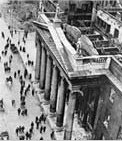



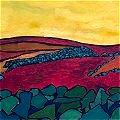
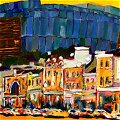
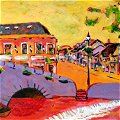
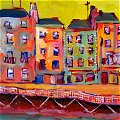

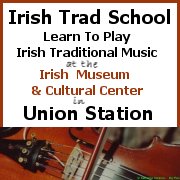


I really like this comment. I would like to have it published in a magazine. I am a military journalist who currently writes for a local base paper in Virginia, but will be editing a magazine I am titling, “Trains, Trams & Trollys. This would make a great article. Please let me know if I can have your permission to publish it.
Please look my articles up online.
Sincerely,
Jennifer Brown
Thanks Jennifer. I’ll contact you by eMail.
Now to be honest, I don’t think the car travelling younger generation really have such issues with Arklow. Probably due to less days on the train - and the car journeys always lasted way too long anyway. Does “getting the messages” mean anything to Americans?